|
Second Annual Himalayan Policy Research Conference 2007 at Madison, (Oct. 11, 2007) organized by NSC, University of New Mexico
At the pre-conference venue of the University of Wisconsin's 36th Conference on South Asia (October 11-14, 2009)
|
| Second HPRC 2007 Announcement, Timeline, Theme, and Seminar Coordinators |
ANNOUNCEMENT
Call for Abstracts
Second Annual Himalayan Policy Research Conference
Nepal Study Center
( October 11, 2007 , Madison )
The Nepal Study Center (NSC: http://nepalstudycenter.unm.edu) is pleased to announce the Second Annual Himalayan Policy Research Conference. The Conference will be held in Madison, Wisconsin at the University of Wisconsin ’s 36th Annual Conference on South Asia ’s pre-conference venue on October 11, 2007, at the Madison Concourse Hotel.
Topics: We invite you to send an abstract of your research, recently completed or in progress, in the field of development, democracy, governance, or environment. We consider these fields broadly as encompassing socio-economic growth (macro or sectoral), political transition, institutional development, governance and administrative reform, poverty and income distribution, education and health, regional development, gender and ethnicity, trade and remittances, aid and foreign direct investment, resource and environmental management, public-private partnership in technology and investment, child labor, and many other issues. The papers are expected to have important implications for public policy in one or more countries of the Himalayan region or South Asia .
Submission guidelines: We accept electronic as well as paper submissions of abstracts. Along with your abstract, please include your name, institution affiliation, e-mail and postal address, and your area of research.
If you are also interested in serving as a session chair or discussant, please include information on the subject areas in which you will be willing to serve.
Submission deadline: The submission deadline is April 23rd, 2007. Your timely response will be highly appreciated.
Contact Address: Send your abstract or Conference/Association inquires to Professor Alok K. Bohara, Nepal Study Center , Department of Economics, University of New Mexico , Albuquerque , NM 87131 , U.S.A. Phone: (505) 277-5903, bohara@unm.edu.
Seminar Coordinators
Alok K. Bohara, Professor, University of New Mexico
Mukti P. Upadhyay, Department of Economics, Eastern Illinois University,
Vijaya R. Sharma, Department of Economics University of Colorado , Boulder
Ambika P. Adhikari, Arizona State University
Gyan Pradhan, Department of Economics, Westminster College
CONFERENCE DETAILS
Conference Rooms: Assembly Room and Caucus Room, The Madison Concourse Hotel and Governor's Club.
Hotel accommodation and other Details:
Nepal Study Center will provide breakfast, lunch and refreshments on the day of the conference, October 11, 2007 . For hotel accommodation at a discount rate, please contact Madison Concourse Hotel.
Other nearby hotel accommodation within .5 to 1 mile:
Doubletree Hotel Madison, 525 W. Johnson Street, Madison, Wisconsin, USA 53703;
Tel: +1-608-251-5511 Fax: +1-608-251-4824 (.5 miles away)
Best Western Inn on The Park, 22 S Carroll Street, Madison, Wisconsin, 53703-3309, US;
Phone: 608-257-8811 Fax: 608-257-5995;
(
0.18 miles away)
Edgewater Hotel,
666 Wisconsin Avenue , Madison, WI;l 1-800-922-5512; (0.28 miles away)
Hilton Madison Monona Terrace, 9 East Wilson Street , Madison, WI;Tel: 608-255-5100 (0.35 miles away)
Holiday Inn Madison At The American Center, 5109 W TERRACE DRIVE MADISON, WI 53718 UNITED STATES
Hotel Front Desk: 1-608-2494220; Fax: 1-608-2494110 (
0.44 miles away)
Hotel Ruby Marie, 524 E Wilson, Madison, Wisconsin (WI) 53703 Telephone: 608-327-7829 or Toll Free: 877-690-7829 Fax: 608-327-7833 (0.48 miles away)
Campus Inn and Chancellors Club, 601 Langdon Street;
Madison, Wisconsin 53703;
(608) 257-4391 (800) 589-6285;
Fax (608) 257-2832; (0.53 miles away)
Hostelling International at Madison: HI-Madison;
141 S. Butler St.;
Madison, WI 53703
(608) 441-0144;
madisonhostel@yahoo.com; (Shared room: $23; Private room: $47 as of September 20, 2007); Two blocks from the Capitol.
Travel Information: (Disclaimer: Use this information at your own risk and after verification.)
To arrive at Madison, the Dane County airport (MSN) is quite convenient, although, it can be somewhat more expensive.
http://www.epodunk.com/cgi-bin/genInfo.php?locIndex=53627
If price is a concern, it may be cheaper to fly into either the Milwaukee Airport (MKE) or Chicago's O'Hare Airport (ORD). There is a bus from O'Hare to Madison that will stop right in front of the UW Memorial Union. Takes about three hours from O'Hare and costs about $25.00. We don't know about ground transportation from Milwaukee, although the distance is 75 miles. Here is the web site of the bus company that provides O'Hare to Madison service:
http://www.coachusa.com/vangalder/
Here is the web site for the main event venue Concourse Hotel: http://www.concoursehotel.com/. Their web site says they have a "free complimentary shuttle" for their hotel guests. The main hotel is generally booked in advance, so your best options would be to look for nearby accomodations (see above).
Conference Proceedings: We had a very successful First HPR Conference in Madison , WI , last October. The proceedings of that Conference were published in a special issue of the Himalayan Journal of Development and Democracy (HJDD). We encourage you to take a look at that HJDD issue at the following site: HPRC 2006. The abstracts, the feedback from participants, and some of the photos and videos are also available there.
Association for Himalayan Policy Research: One of the goals of the annual HPR conference is to form an Association for Himalayan Policy Research and obtain a membership of the Allied Social Science Associations which conducts annually the largest of such conferences in the U.S. For this purpose, Nepal Study Center has prepared NSCPolicyResearch-L, a list of people conducting policy research in related fields. If you are a research scholar but not yet a member of this group, we encourage you to sign up for the listserve and contribute to forming the Association.
For further details about the whole SA conference, please check the University of Wisconsin's 37th South Asian Conference Website.
CONFERENCE COORDINATORS
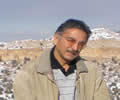 |
Dr. Alok K. Bohara is a professor of economics at the University of New Mexico (UNM), and the founder of the Nepal Study Center at UNM. His research focus is in the areas of environment and development and their relationships with poverty and conflict. His is currently interested in looking at the ways of using the information communication technology (ICT) to alleviate poverty (health, education, and the environment). He is interested in undertaking initiatives to foster global scholarly connectivity to promote interactions among the scholars with policy research interest on the Himalayan region. |
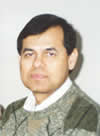 |
Dr. Mukti Upadhyay is an associate professor of economics at Eastern Illinois
University. He specializes in development economics with a focus on macro and
international aspects of development. |
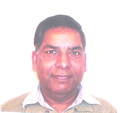 |
Dr. Vijaya R. Sharma., Faculty in the Economics Department of University of Colorado, worked from 1975 to 1990 in the field of industrial sector policy, planning, and programs in Nepal and was an active member of the task force to prepare the Seventh Five-Year Industrial Development Plan and the 1987, Industrial Policy. |
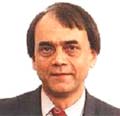 |
Dr. Ambika P. Adhikari is an Urban Planner with the City of Phoenix, and a Faculty Associate at Arizona State University. He was the Country Representative of IUCN - the World Conservation Union in Kathmandu Nepal, where he provided overall leadership and management and developed several programs in nature conservation and environmental management. Dr. Adhikari received Doctorate in Urban Planning from Harvard University, obtained post graduate fellowship at MIT and M. Arch. from University of Hawaii. He has authored one book, co-edited four, and published numerous reports, refereed and other articles in varopis journals.
|
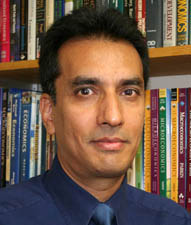 |
Dr. Gyan Pradhan is Associate Professor of Economics and the John E. Simon Chair in Business at Westminster College. He earned a PhD in Economics from American University (USA). His teaching and research interests include macroeconomics, international economics, development economics and public economics. He was chair of the ABEMIS department from 2000-2004. He is also a visiting faculty member at Washington University in St. Louis.
|
This forum is created to help participants share information
about the HPRC conference related logstical issues --hotel room sharing,
travels, restaurants, meals, sightseeing etc.
They are also welcome to discuss any other issues related to the NSC's activities: annual Himalayan conferences, e-seminars, journals, creation of an association and so on. Click here: HPRC Message Board.
| Program Outline, Panelists, and List of Participants, Paper Abstracts, Full Paper Drafts |
PROGRAM OUTLINE, PANELISTS, AND LIST OF PARTICIPANTS
Download: Conference Session Program Outline: panelists, list of participants (As of October 4, 2007)
PAPER ABSTRACTS
Download: List of Abstracts (As of Sept 30, 2007)
FULL PAPER DRAFTS
Downloads: These conference papers are uploaded on the UNM's Dspace open access e-repository:
Himalayan Research Papers Archive. For any questions, please contact Mr. Prakash Adhikari, Himalayan Research Papers Archive NSC-UNM coordinator: prakash@unm.edu
Rural Vulnerability and Tea Plantation Migration in Eastern Nepal and Darjeeling
Sarah Besky , University of Wisconsin , USA
Domestic Health Hazard and Indoor Air-Pollution: An Approach to Find Alternative Energy Source for Rural Bangladesh to Minimize the Threat
S.M. Reazul Ahsan and Jinia Afrin , Khulna University , Bangladesh
People’s Perceptions of Green Space Park in Pokhara, Nepal
Padam Giri , P.N. Campus, Tribhuvan University, Nepal
Krishna Shrestha , Michigan State University, USA
Bishwo Kallyan Parajuli , Tribhuvan University, Nepal
Murari Suvedi , Michigan State University, USA
Identification of natural resources at watershed level: an initial step of mainstreaming of the Federal restructure in Nepal
Madan Koirala, Tribhuvan University, Nepal
Trade Potentility and Ecological Analysis of NTFPs in Himalayan Kingdom of Nepal
Krishna L. Poudel, Himalayan College of Agricultural Sciences and Technology, Nepal
Political Participation and Civic Literacy in Bajung: An Empirical Study with Correlation Analysis
Khadga K.C., Nagasaki University , Japan
Prioritizing and Estimating Hydropower Project Construction Risks: A Case Study of Nyadi Hydropower Project
Kamalesh Panthi, Florida International University, USA
Political predictions in Nepal,
Aditya Man
Shrestha, Journalist, Nepal
Economic Inequality in the ‘Democratic’ Nepal: Dimensions and Implications
Udaya R
Wagle, Western Michigan University, USA
Inequality, Polarization and Violent Conflict: The Maoist Insurgency in Nepal
Mani Nepal, University of New Mexico, USA
Alok K. Bohara, University of New Mexico, USA
Kishore Gawande, Texas A&M University, USA
An Assessment of the Causes of Conflict in Nepal
Bishwa Nath Tiwari, Tribhuvan University, Nepal
The Human Dimensions of Land Change in Lamjung of Nepal
Milan Shrestha, University of Georgia
A Community Based Micro Hydro: A Promising Technology for Rural Development in Nepal
Bishwa Koirala, University of New Mexico
Effects of Deforestation on Tree Diversity and Livelihoods of Local Community A Case Study from Nepal
Krishna Karkee, Centre for Disaster Management Studies, Nepal
Recruiting Rebels: Indoctrination and Political Education in Nepal
Kristine Eck, Uppsala University
The Effect of Remittances on Child Labor and Child Education in Nepal
Michael Milligan and Alok Bohara , University of New Mexico
Community based integrated natural resource management: Policy options and areas of intervention
Sabita Thapa, John Soussan, Dhruba Pant, Umesh Nath Parajuli, Khem Raj Sharma, Binod Bhatta, WWF-Nepal
Coping with Unreliable Water Supplies and Willingness to Pay for Improved Water Supplies in Kathmandu, Nepal
Hari Katuwal and Alok Bohara, University of New Mexico
Pursuing Democracy: Explaining Political Transitions in Nepal
Prakash Adhikari and James Timberlake, University of New Mexico
“Retainer” Bureaucracy: An Impediment to the Process of Democratic Governance in Nepal
Sucheta Pyakuryal, The University of Akron
(Papers are still being uploaded.)
| Acknowledgement, Conference Survey Feedback and Comments |
ACKNOWLEDGEMENT
NSC would like to acknowledge the financial support for the conference by these individuals:
Ambika Adhikari $100; Alok K. Bohara $100; Dharmendra Dhakal $100; Gyan Pradhan $100; Vijaya Sharma $100; Mukti Upadhyay $100; Kamal Upadhyaya $100; Jagadish Upadhyaya $100; Gaury Adhikary $100; Girija Gautam $100; Rajendra Shrestha $100; Samantha Thapa $100; Department of Economics (Chair's travel allowance).
NSC would also like to thank Maria Daw and Angela Kamman (Department of Economics), Prakash Adhikari (graduate student), and Bishal KC (IT advisor) for their help. Special thanks also goes to Dr. Vijaya R. Sharma and Dr. Gyan Pradhan for putting together the program outline and abstract compilation. Similarly, we appreciate the help of Dr. Ambika Adhikari and Dr. Mikti Upadhyay in organizing the refreshment and venue setup.
Importantly, NSC is grateful to the participants, especially those coming from outside the US, for making the event highly successful by participating in it. Finally, we would like to thank James Timberlake and Prakash Adhikari (doctoral students: Department of Political Science, UNM) for handling the registration booth at the conference venue.
SURVEY RESULT SUMMARY AND FEEDBACK
"And thanks to you guys for organizaing such a great conference. It was one of the best I have been to, in terms of interaction, feedback, networking opportunities and finding commonalities between the presenters. I am grateful that you invited me and look forward to returning next year, should there be another conference."
Best,
Kristine Eck, Uppsala University
"There was a gathering of some 60 scholars, professionals and policy practitioners of Nepali origin engaged in intellectual discussions on Nepali issues with a deep concern for its democracy and development." More Part I
" This is the general impression one could get from listening to the findings of the research studies made on Nepal. The opportunity was provided by Nepal Study Center based in University of New Mexico at Madison, Wisconsin on October 11, 2007. It is an open forum for researchers on Nepal to share their findings with a professional group hailing from all over the world. It is basically an assembly of academic exercises done in different universities the world over on Nepal." More Part II
Aditya M. Shrestha
Second Annual Himalayan Policy Research Conference (HPRC)
Organized by the Nepal Study Center ( University of New Mexico )
October 11, 2007 Pre-conference venue of the University of Wisconsin-Madison’s 36 th Conference on South Asia
Of the 40 abstracts submitted initially, 26 papers were finally presented at the Second Annual HPRC 2007. The conference was organized in seven sessions, and it occupied two rooms for a whole day. A wide range of topics were covered such as: environment, poverty, inequality, conflict, natural resources, GIS, land use, remittance, ethnicity and gender. Most papers were driven by analytical approach but with deep policy implications.
On average, there were about forty to fifty participants attending the sessions at any point. Participants came from the US , Nepal , Sweden , Switzerland , and Japan . Several doctoral students also participated from various universities. Participants were served complimentary breakfast and lunch as well as snacks and drinks throughout the day. A presentation on various activities of the Nepal Study Center during the lunch hour was also well received. The conference ended with a dinner gathering at a Nepali restaurant Chautara on the State Street .
The survey responses appear below following each question:
1. This is our second annual HPRC conference. What is your opinion about continuing this event in future on a scale of 1 to 10 (10: strongly in favor)? ______
Mean = 9.7, median = 10.
(Out of 29 scores received, 26 were a perfect 10. This highly favorable rating was mostly because of the overwhelming policy focus of the research presented.)
2. NSC is thinking about putting together a proceedings volume of the conference. Would you be willing to contribute your expanded version of the abstract?
Yes ______ No ______ Not Sure ______ Not Applicable ______
90% Yes, 10% Undecided
3. On a scale of 1 to 10 (10 being highest), what is your likelihood of attending the HPRC in Madison next year:
(a) if held on Thursday, like this year, ___________
(b) if held 3 days later on the following Sunday ________________
The response was somewhat tilted towards the Thursday schedule. A group discussion among a few of us saw pros and cons with both schedules, but thought a Thursday schedule would be more attractive to those who would come there to attend the UW’s South Asia conference. It is also worth noting that the HPRC’s policy research focus complements the UW’s South Asian’s primary theme of culture, language, history, arts, and religious studies.
4. If this Conference were to be held at the University of New Mexico (during a weekend), what would be your likelihood of attending the HPRC next year on the scale of 1 to 10 (10 highest)? ______
Mean = 7.6
5. Rate the overall satisfaction with the 2007 conference on a scale of 1 to 10 (10 highest): ______
Mean = 9.7
6. NSC is taking a knowledge transfer initiative sending faculty/doctoral students to Nepal to conduct training/workshop/lectures to help Nepali scholars and institutions. Would you like to help and be contacted for this?
Yes ___ (email: _____________________________________) No ___ N/A ___
If yes, what would be the area of your skill-set? ______________________________
What time frame would you prefer? Summer ___ Fall ___ Spring ____ Other/All ____
There was a strong positive response: 75 % yes
(Knowledge skills mentioned in responses: biodiversity, GIS and remote sensing; cultural policy; econometrics; environmental economics; resource economics; women’s health issues; conservation biology; poverty and inequality; political science)
7. There has been a suggestion to change the NSC’s name to reflect its wider regional scope to help enhance participation and generate funding opportunities. Show your best choice as 1, then 2…:
Himalayan Studies Center ____ Himalayan Policy Studies Center ____
South Asia Studies Center ____ Center for Himalayan Policy Studies ____
Keep the current name: Nepal Study Center ____
Seventy five percent of the respondents preferred to widen the scope of the policy research area by changing the name of NSC. Twenty five percent preferred to name it South Asian Studies Center while a strong majority was split between Himalayan Policy Studies Center and Center for Himalayan Policy Studies. This debate will continue for a while because much of the resource currently bears the name of NSC.
Click here for HPRC 2007 Proceedings.
Click here for HPRC 2007 conference photos
|
 |
|







